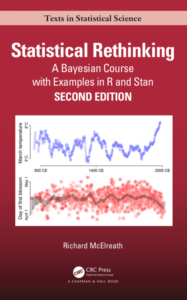 As “new blood” enters the workforce, I am pleased to see the technical skills at the client growing again as well as the desire to understand the more technical concepts behind our approach to shopper response analytics. In the last couple of months, I have been asked multiple times on how to best self-train on Bayesian Statistics and Probabilistic Programming. This blog provides some quick pointers. I am a huge fan of Richard McElreath’s Statistical Rethinking. The second edition was released earlier this year. It is a textbook that does not read like a textbook. Unlike most of these that I treat as reference material, I read this one cover to cover and preformed the step by step calculations with my laptop side-by-side. McElreath meant for that kind of interaction to be the learning model. Another great toolbox is John Kruschke’s Doing Bayesian Data Analysis. A lot of folks refer to this as “the puppies book” based on the clever use of dog breeds on the cover to present Bayes Theorem. If you can attend one of Kruschke’s workshops, I highly recommend it. I was able to do so at Kent State University in 2016 and anxiously look forward to the opportunity for the next one.
As “new blood” enters the workforce, I am pleased to see the technical skills at the client growing again as well as the desire to understand the more technical concepts behind our approach to shopper response analytics. In the last couple of months, I have been asked multiple times on how to best self-train on Bayesian Statistics and Probabilistic Programming. This blog provides some quick pointers. I am a huge fan of Richard McElreath’s Statistical Rethinking. The second edition was released earlier this year. It is a textbook that does not read like a textbook. Unlike most of these that I treat as reference material, I read this one cover to cover and preformed the step by step calculations with my laptop side-by-side. McElreath meant for that kind of interaction to be the learning model. Another great toolbox is John Kruschke’s Doing Bayesian Data Analysis. A lot of folks refer to this as “the puppies book” based on the clever use of dog breeds on the cover to present Bayes Theorem. If you can attend one of Kruschke’s workshops, I highly recommend it. I was able to do so at Kent State University in 2016 and anxiously look forward to the opportunity for the next one.
Andrew Gelman’s expertise and commitment to forwarding the Bayesian cause is equally unquestionable. His Bayesian Data Analysis text with several co-authors is the go-to reference book for most statisticians. In late July, I was able to scoop up the hot off the presses Regression and Other Stories that looks equally exciting since it steers away from theory and more toward how to use regression to solve real world problems. I admit that I have not had the bandwidth to go through it yet. It is on the list of catch up materials during the upcoming holidays.
Textbooks are not for everyone, so I do have an excellent training alternative. Over the course of my development work, I have been fortunate to get to know Peadar Coyle. He is one of the core members of the PyMC3 team. There could be an entire blog on how PyMC3 is bring Bayesian capabilities to the masses. However, Peadar has put together an excellent course on Probabilistic Programming and Bayesian Statistics found at https://probabilisticprogrammingprimer.podia.com/ that I bought in 2018. The course explains the Bayesian concepts and leverages Probabilistic Programming to fundamentally quantify uncertainty through real world applications. Each module is targeted at helping business leaders understand and manage risks for decision making.
As a final shout out for Peadar, it is worthwhile to look at the fascinating new company he stated called Afloithmic. They are making audio more personal. Enabling small businesses to better engage and grow their business by making it easy to turn blogs or whatever into personalised audio microcontent. https://www.audiofunnel.co/ is a wonderful example.
Middlegame is the only ROMI consultancy of its kind that offers a holistic view of the implications of resource allocation and investment in the marketplace. Our approach to scenario-planning differs from other marketing analytics providers by addressing the anticipated outcome for every SKU (your portfolio and your competitors’) in every channel. Similar to the pieces in chess, each stakeholder can now evaluate the trade-offs of potential choices and collectively apply them to create win-win results.
